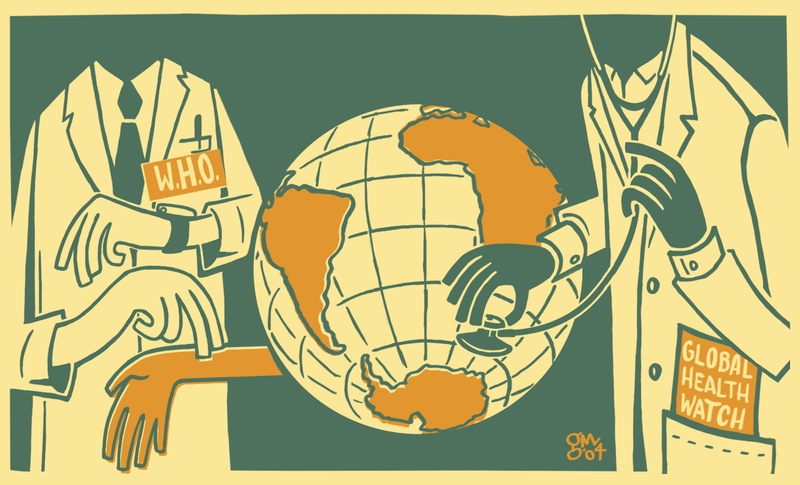A recent commentary, published in Academic Psychiatry, explores the potential for the structural competency framework to move the debate around global mental health beyond the impasse between supporters and critics. Between the criticisms and defenses of the Movement for Global Mental Health (MGMH), the importance of social and structural determinants of health have gone largely unaddressed.
An international team of researchers led by Amy Gajaria identifies structural competency, developed in 2014 by Johnathan Metzl and Helena Hansen, as a framework that addresses this oversight by training health providers to engage in critical thinking and structural change. Authors of the commentary, including co-developer of the framework, Helena Hansen, write:
“At the moment, neither MGHM nor cultural psychiatry has developed a clear framework to help learners approach the larger socio-political structures affecting the mental health of people in LMICs. We suggest that structural competency could be an option to fill this gap.”
 The MGMH has been received critically, by cultural psychiatrists in particular, since its launch with the 2007 Lancet Global Mental Health series. The aims of the MGMH center around practicality, argue Gajaria and colleagues. The overarching mission includes expanding services to low- and middle-income countries (LMICs) and an understanding of mental health within a biomedical framework.
The MGMH has been received critically, by cultural psychiatrists in particular, since its launch with the 2007 Lancet Global Mental Health series. The aims of the MGMH center around practicality, argue Gajaria and colleagues. The overarching mission includes expanding services to low- and middle-income countries (LMICs) and an understanding of mental health within a biomedical framework.
Three primary objectives characteristic of the MGMH mission to modify existing service delivery include: (1) addressing the “treatment gap” between those who meet criteria for psychiatric “disorders” and those actually receiving treatment, (2) “scaling up” treatments by expanding mental health services to a broader population, and (3) “task-shifting” approaches that train lay health workers to provide services typically within the purview of physicians’ expertise.
Cultural psychiatrists, however, approach mental health in non-Western societies through an anthropological perspective. They are among those that have criticized the MGMH for misapplying culture-specific Western treatment paradigms. On a practical level, they argue, overlooking local treatment approaches and perspectives of distress risks not only reducing access to healing but exacerbating mental health conditions.
Gajaria and colleagues point out, however, that both the MGMH and cultural psychiatrists, respectively, structural conditions that contribute to distress have been inadequately addressed. Factors such as institutional racism, economic inequality, war, and other, more extensive, power structures, also referred to as social and political determinants of health, have been understood as phenomena observable at the individual level. The researchers explain:
“Both cultural psychiatry and the MGMH consider the social determinants of health, but have traditionally looked at determinants such as income and literacy without attending to greater political and economic processes that lead to disparate incomes and literacy rates.”
They cite author China Mills (see MIA podcast) who calls this process “the psychiatrization of economic suffering” and psychiatrist Derek Summerfield (see MIA podcast) who writes of how this process relocates “a public and collective problem” to a “private and individual problem,” effectively relocating a socio-political space into a mental one.
The framework of “structural competency,” write Gajaria and team, “could be an option to fill this gap.” Structural competency refocuses problems as located within a structural, socio-political space. Metzl & Hansen (2014) developed a particular set of knowledge and skills “that equip medical professionals to identify and act on the social and political arrangements that create systemic inequalities in health.” The term “structural competency” refers to concepts such as cultural competence and cultural humility that have grown more popular in the mental health field.
Gajaria and colleagues connect these constructs:
“The concept of cultural humility—which asks clinicians for curiosity regarding the cultural context of their patients, and to collaborate with patients to draw on patients’ self-knowledge, thereby leveling power inequalities between clinicians and patients—has been deployed out of recognition that the model of an omniscient clinician unilaterally exercising knowledge has the potential to reinforce inequalities.”
They go on: “Similarly, structural humility calls on clinicians to collaborate with, and recognize the expertise of, community organizations and professionals in other disciplines while acknowledging the reality that structural change requires patience.”
The structural competency framework encourages health providers to address the structures that influence health. Competency involves taking a critical perspective to determine how structures and systems affect health and then subsequently engaging actively to alter these structures. The team writes:
“Similar to critics of MGMH, advocates of structural competency argue that failing to consider the socio-political context in which patients live misses a vital piece of the mental health of people in LMICs.”
Gajaria and colleagues outline a case example of a Nepalese woman experiencing physical symptoms interrelated to numerous structural determinants of health. Through a structural competence lens, the researchers illustrate the five competencies in action: (1) “recognizing the structures that shape clinical interactions;” (2) “developing an extra-clinical language of structure;” (3)“rearticulating ‘cultural’ presentations in structural terms;”(4) “observing and imagining structural intervention;” and (5)“developing structural humility.”
They describe the framework as offering a new way forward by addressing structural concerns in unprecedented ways:
“While many have criticized global mental health training for failing to address structural concerns, to our knowledge, there has not been a clear model for training practitioners in global mental health to address systematic inequalities and other structural issues.”
Furthermore, the structural competency framework is amenable to integration within a broad range of training curricula and tailored to multiple types and levels of trainees. Gajaria and team highlight the promise of this approach to attending to complex global issues in nuanced ways. They conclude:
“If addressing structural determinants of mental health in global settings sounds like a big task, it is.” Humility, they argue, will play a critical role in the successful implementation of this framework:
“Humility is particularly relevant to global mental health; it is difficult to fully grasp the social, political, and economic landscape of another region. Global mental health work, and therefore global mental health training, must recognize the complex forces at work in a place, seek the expertise of those with deep experiential knowledge of the community, and collaborate with them in structural interventions.”
****
Gajaria, A., Izenberg, J. M., Nguyen, V., Rimal, P., Acharya, B., & Hansen, H. (2019). Moving the Global Mental Health Debate Forward: How a Structural Competency Framework Can Apply to Global Mental Health Training. Academic Psychiatry, 1-4. https://doi.org/10.1007/s40596-019-01073-3 (Link)















“The overarching mission includes expanding services to low- and middle-income countries (LMICs) and an understanding of mental health within a biomedical framework.
Three primary objectives characteristic of the MGMH mission to modify existing service delivery include: (1) addressing the “treatment gap” between those who meet criteria for psychiatric “disorders” and those actually receiving treatment, (2) “scaling up” treatments by expanding mental health services to a broader population,”
Ahh, good old missionary work again, being extended in kind to global “care”. Brainwashing those who would like to hold onto some traditional coping/treatment.
Of course we bring in something like “structural competency”….we appeal to those aware of socio/political cause, we appeal to those that are promised such things as “humility”…And then we combine everything which we call “bridging the gap”, and deliver the same exact BS care EXCEPT, to MANY more people.
After all, EVERYONE should have access to mental care. Meaning psychiatry and it’s poison drugs.
We have to reach those that so far have resisted care due to stigma and so, let’s throw in an anti-stigma campaign.
So there ya go, another few papers written, a few more meetings and discussions with cute words and reframing, just to sell the same goods to more people.
Yuck
Report comment
#word
Report comment
Way to hide that embarrassing truth…that people in developing nations recover from what they would call “severe mental illness.”
Shrinks are scared Westerners abroad will discover this. The solution? More chemically crippled brains all over the globe to “prove” how hopeless their test subjects are.
Report comment
http://libraryofessays.com/
Thank you for the help with my power point presentation. I am not very good at this sort of thing. That’s why I am so happy to have found your custom writing service. You really helped me out on this one. Thank you so much! You operate a fantastic service!
Report comment
this could work
Report comment
Convince enough people that they are “sick” and you are set for life. However, I think there are better things that one might be doing.
Report comment
Humility – “a modest or low view of one’s own importance, humbleness.” There is less than zero humility in the Western civilization, psychiatric/psychological establishment, that has been, and still is, unrepentantly murdering 8 million people a year.
https://www.nimh.nih.gov/about/directors/thomas-insel/blog/2015/mortality-and-mental-disorders.shtml
That would be an all Western civilization psychiatric holocaust, amounting to 400 million deaths over the past 50 years.
And all those deaths, based upon so called “mental illnesses,” that have no scientific validity whatsoever.
https://www.nimh.nih.gov/about/directors/thomas-insel/blog/2013/transforming-diagnosis.shtml
And you want to take your murder spree to the rest of the world … No, bad idea. Repent for your mass murders of 400,000,000 Western civilization innocent people first. I guess, Thomas Insel has done so. The rest of the psychiatric/psychological industries need to repent as well. But they haven’t, because they have less than zero humility.
Report comment
The LMICs
maybe can defend themselves if they are able to stockpile enough tar and feathers to run the western syfilization, psychiatric/psychological establishment out of town one by one. The people need to be warned.
Report comment